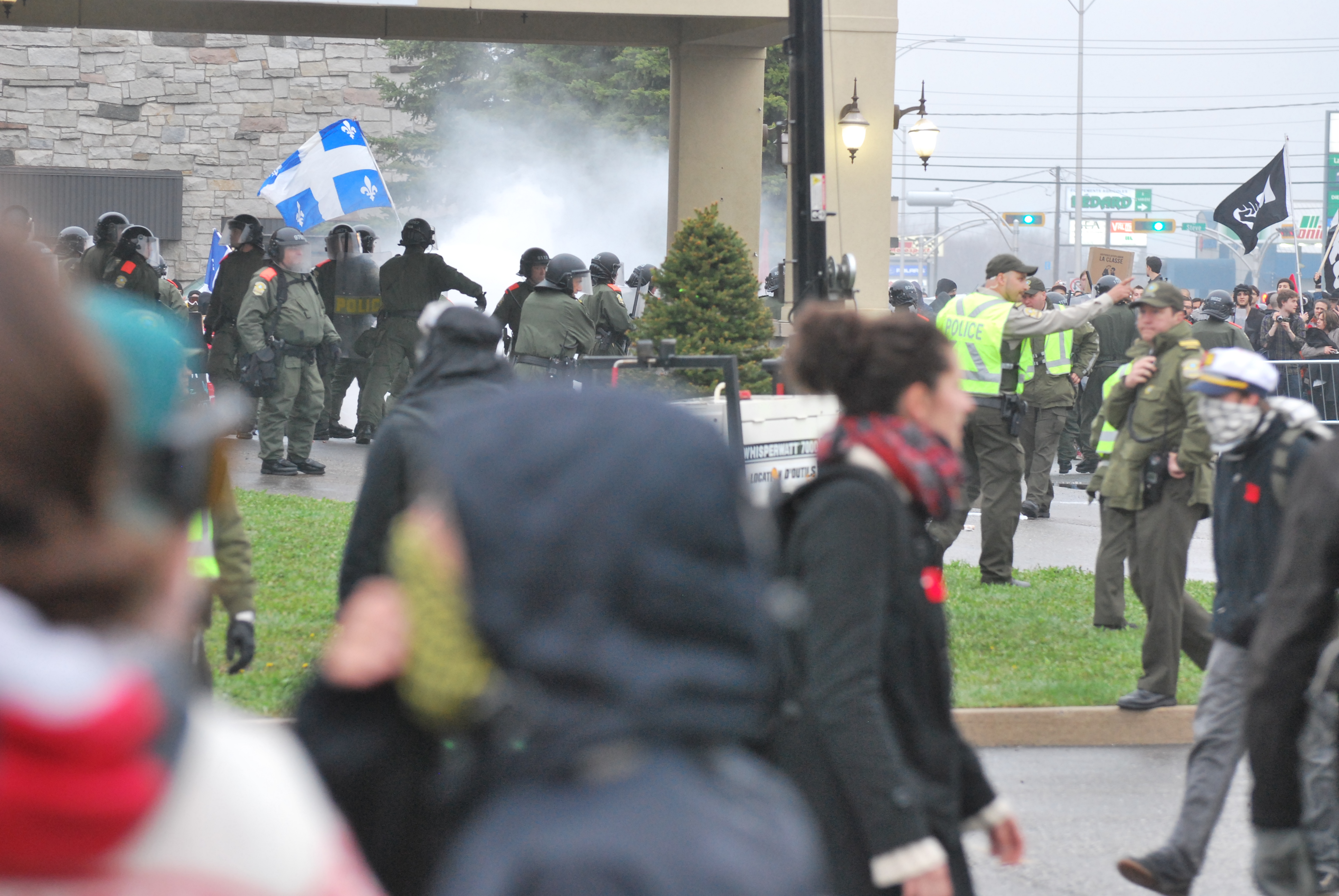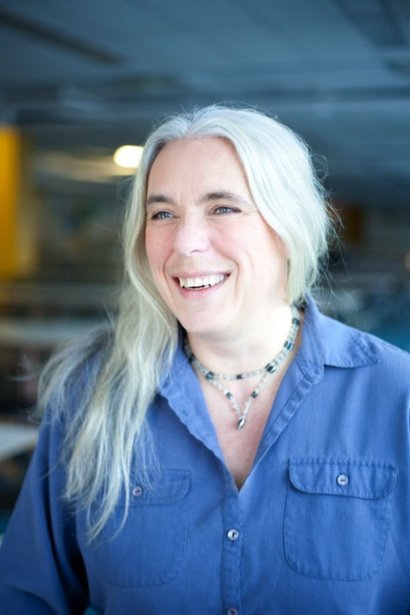Gabriel Nadeau-Dubois, politician, activist, author and communicator (born 31 May 1990 in Montreal, Quebec). Gabriel Nadeau-Dubois has served in Quebec’s National Assembly as the member for Gouin since May 2017. He was also the co-spokesman for Québec solidaire from May 2017 to March 2025. He first became well known during the 2012 Quebec Student Strike, as its most visible representative in the media. At that time, he and Jeanne Reynolds served as co-spokespersons for a broad coalition of student organizations known as Coalition large de l’Association pour une solidarité syndicale étudiante (CLASSE). He marched in the streets of Quebec alongside thousands of student demonstrators demanding that the Quebec government cancel its plans to raise tuition fees by $1,625 over five years. (See 2012 Québec Student Strike.)

Early Years
Gabriel Nadeau-Dubois comes from a family of union and environmental activists. His father, Gilles Dubois, is a former vice-president of the CSN central council for metropolitan Montreal and has also chaired Montreal’s regional council for the environment. Nadeau-Dubois was introduced to activism and citizen action at an early age, accompanying his father to demonstrations and union meetings. (See Union Centrals, Quebec.) Young Gabriel was curious and quickly took an interest in the class struggle and in social and environmental movements. (See also Environmental Movement in Canada.) When attending union meetings with his father, he was more interested in listening to the debates than in finishing his homework, which is what he was supposed to be doing. This was the time when the subjects of free trade and globalization of markets were in the news more and more, and Nadeau-Dubois kept a close eye on them, reading the newspapers every day. In those days his dream was to become an international journalist.
Student Activism
When Gabriel Nadeau-Dubois began secondary school at Collège Régina Assumpta, a private institution, his activism came to the fore. Vigorously opposing the school’s administration’s practice to appoint all class representatives itself, he instead secured permission for the student community to run its own election, which was held the following year. Nadeau-Dubois’s future as a committed activist was becoming clear. One of his former teachers later said that he “had a lively intelligence. He listened to his group. He wasn’t afraid to enter the clash of ideas, even with adults. He loved to argue. He was a born leader, and his fellow students followed him.”
In the fall of 2007, Nadeau-Dubois began his studies in social sciences and humanities at the Collège de Bois-de-Boulogne. (See also CEGEP.) He excelled at mobilizing the student body around various social issues, which he used as an opportunity to distribute leaflets for the college’s student association. At this time he joined the ASSÉ, an association for student union solidarity, where he became vice-president of the executive and person in charge of external affairs.
2012 Quebec Student Strike
In April 2010, while studying for his bachelor’s degree in history, culture and society at the Université du Québec à Montréal (UQAM), Gabriel Nadeau-Dubois was elected secretary for communications and spokesperson for the ASSÉ. In December 2011, as co-spokesperson with Jeanne Reynolds, he joined the Coalition large de l’Association pour une solidarité syndicale étudiante (CLASSE) ― a temporary coalition of student associations that at its peak had nearly 100,000 student members in Quebec’ colleges and universities. CLASSE spoke with a single voice when Quebec students confronted the Jean Charest government in an unlimited general strike in 2012. (See 2012 Quebec Student Strike.)
This movement had begun in March 2010, when Quebec Finance Minister Raymond Bachand presented the Quebec Liberal Party government’s eighth budget. This budget included a set of measures called virage tarifaire (cost shift). One of the measures was to increase the university tuition fees starting in the fall of 2012.
During this student strike and the months of student occupations of the streets of Quebec, Nadeau-Dubois became a major presence in the media. He managed to polarize a segment of public opinion and a few political figures in the government. Tensions grew between the student movement and the police (see Police in Canada). Nadeau-Dubois’s critics faulted him for failing to condemn the acts of violence and vandalism that marred the daily demonstrations. During a televised debate in April 2012, he said that CLASSE “disassociated itself from certain actions,” but stopped short of condemning them. He added that it was “the students who control this movement. The current situation was predictable; no other group in society would agree to being treated the way that the students have been. What other group could go on strike for nine weeks and not even be invited to talk [with the government]?”
On 9 August 2012, Nadeau-Dubois resigned as co-spokesperson for CLASSE. In an open letter to all members of the association and to everyone who had participated in the demonstrations, he wrote: “I think that for a premier who is so eager for the student movement to condemn intimidation and violence, Jean Charest has subjected the students and me personally to an unprecedented degree of violence. I need to take a break now, somewhere far away from all these attacks.” Less than one month later, the strike came to a natural end when the Parti Québécois won the provincial elections and cancelled the tuition increase.
Political Career
Following the student strike of 2012, Gabriel Nadeau-Dubois appeared as a guest panelist to discuss political and social issues on various television and radio programs from time to time.
In the fall of 2016, Nadeau-Dubois organized a tour of Quebec with the non-partisan citizens’ initiative called Faut qu’on se parle (we need to talk with each other). Along with four other founding members, he moderated informal coffee meetings, in which citizens expressed their views about the future of Quebec. The following year, the group published a book about what the citizens had told them, entitled Ne renonçons à rien (let’s not give up on anything).
Following the departure of Françoise David as co-spokesperson for Québec solidaire in January 2017, Nadeau-Dubois ran as the party’s candidate for Member of the National Assembly in a by-election in the Montreal riding of Gouin. It was the same year that he completed his master’s degree in sociology at UQAM.
He was elected on 29 May 2017 and became the male spokesperson for Québec solidaire. The party’s female spokesperson, Manon Massé, let the new MNA get his bearings while she handled the main debates. The following year, in the 2018 election campaign, Nadeau-Dubois took a position in favour of greater protection for the environment. He also took stands on major social issues such as immigration and education. He condemned xenophobia and the rejection of multiculturalism. He also denounced Americanization as a threat to Quebec culture. (See Canada and the United States.) He was re-elected to his seat with 59.14% of the votes, and his caucus named him parliamentary leader for Québec solidaire, which had become the Third Opposition Group.
On 7 November 2019, Nadeau-Dubois published an essay that was, as its title indicated, “an open letter from an MNA who is worried to a premier who should be worried.” In this book, Nadeau-Dubois took Quebec Premier François Legault to task for his party’s lax approach to environmental issues.
In September 2021, Nadeau-Dubois became House Leader for Québec solidaire, with the stated goal of promoting a just environmental transition. At the same time, he acknowledged his ambition to become premier of Quebec in the provincial general election of 3 October 2022.
When the results of this election were in, Québec solidaire had won 11 seats in the National Assembly and 15.43% of the votes. Nadeau-Dubois was re-elected MNA for Gouin. He is now leader of the Second Opposition Group and its critic on the fight against climate change.
In March 2025, following his return from paternity leave, he announced that he would be stepping down from his roles as co-spokesman and parliamentary leader. He also declared that he intends to leave politics after the end of his current term in 2026.

 Share on Facebook
Share on Facebook Share on X
Share on X Share by Email
Share by Email Share on Google Classroom
Share on Google Classroom



